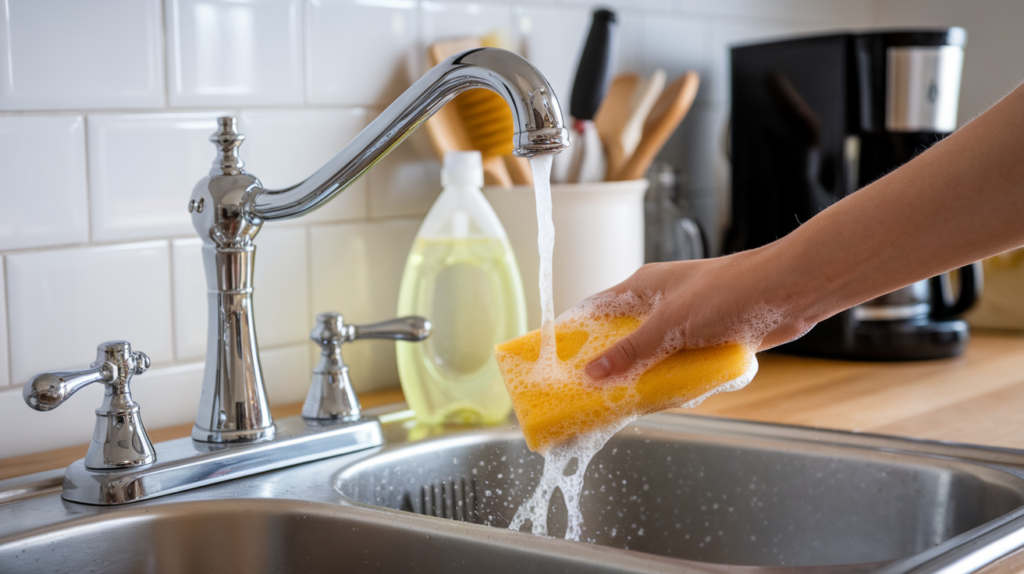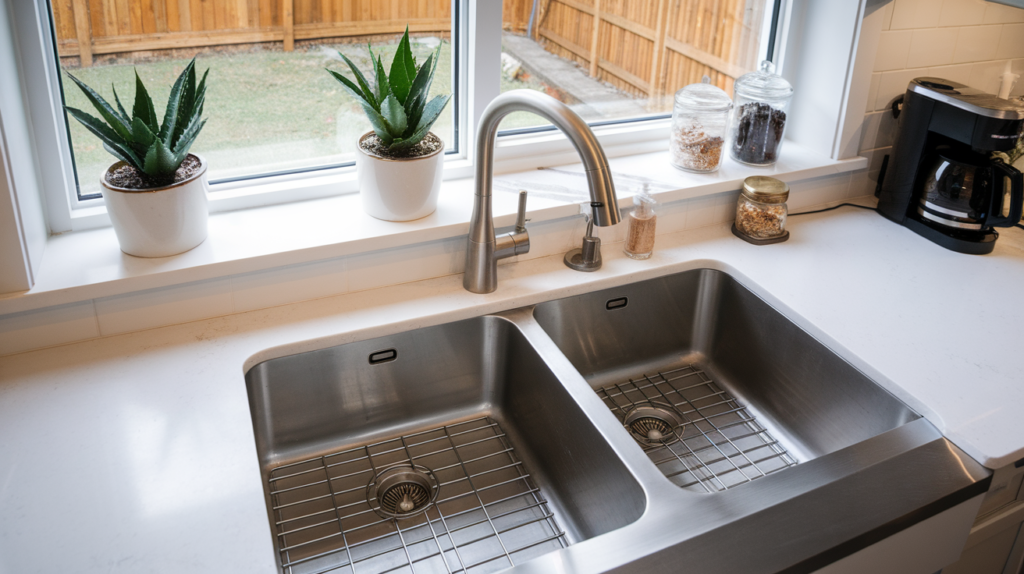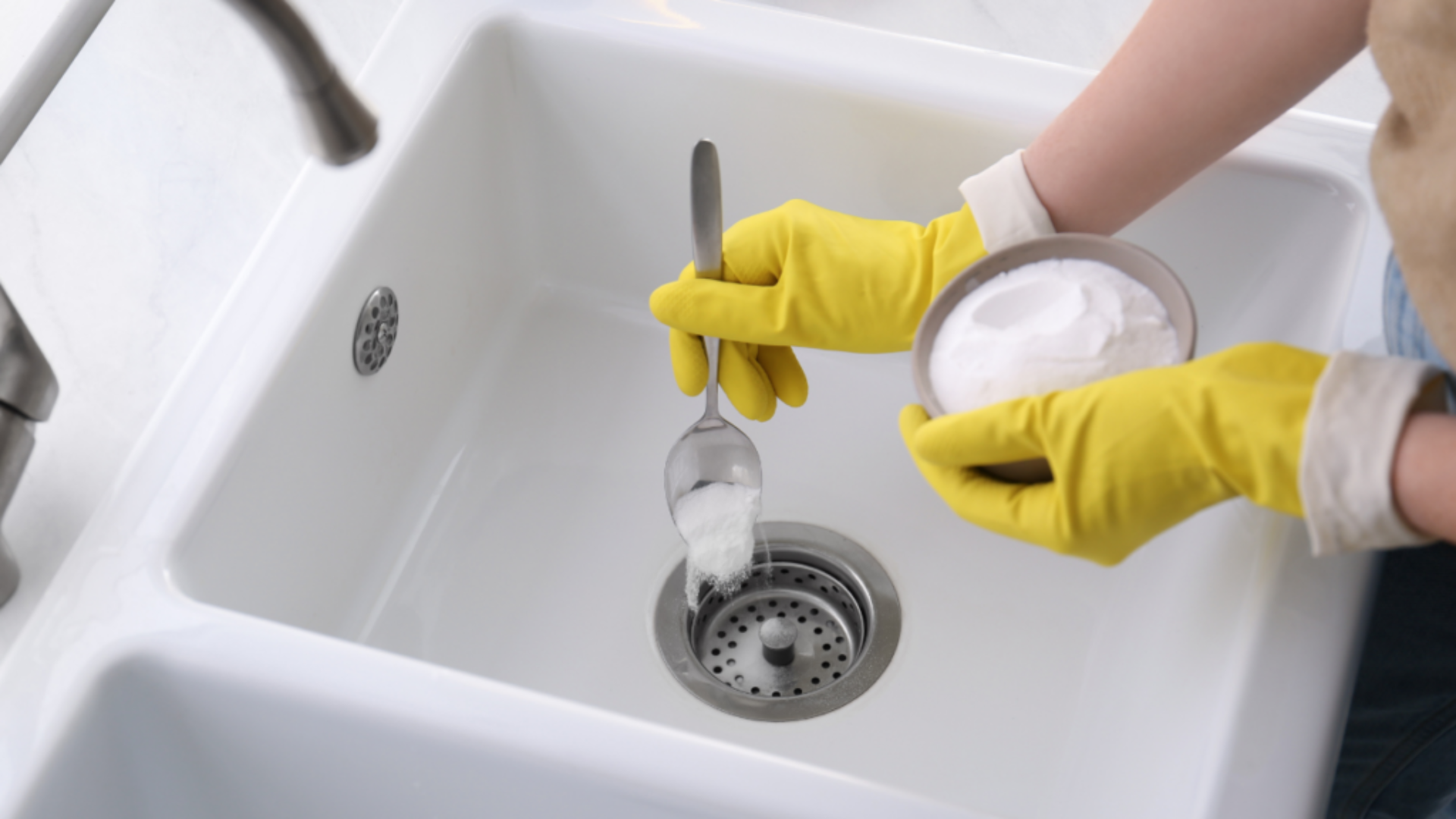Ever walked into your kitchen only to be greeted by a funky smell? You check the trash. You wipe the counters. Still, the stink lingers, and it’s coming from the sink.
Don’t worry because you’re not alone. This is a common issue in many clean, well-kept homes. It doesn’t mean your kitchen is dirty or that you’ve done something wrong.
In this guide, I’ll break it all down in plain language. You’ll learn:
- What causes kitchen sink smells
- Easy ways to fix the problem yourself
- How to keep the odor from coming back
If you’ve searched “kitchen sink smells,” you’re ready for answers. This post is here to solve that exact problem. You can trust my advice. It’s practical, tested, and simple.
Whether the smell is mild or really strong, you’ll walk away with real steps, not just guesses.
What Causes Kitchen Sink Smells?
If your kitchen smells sour or musty, the sink is often the source. There’s more than one reason behind it, and it’s not always what you expect.
1. Food Buildup
I’ve had this happen more times than I’d like to admit. Little food scraps slip past the strainer and get stuck in the drain or garbage disposal.
They sit, rot, and smell bad. If your sink smells like old leftovers, this is often the cause. It’s common and easy to overlook.
2. Grease and Oil
You might think liquid grease is harmless. I used to think the same. But once it cools, it sticks to the inside of your pipes and begins to smell like spoiled food.
It clings to bits of waste, making the problem worse over time. Avoid pouring it down the sink.
3. Bacteria and Mold
Dark, wet places like your sink drain are a perfect home for bacteria and mold. Once they start growing, they can produce a strong, musty smell.
I didn’t realize this until cleaning didn’t help. Sometimes, the issue is deep inside the drain, not what you can see or reach.
4. Dry P-Trap
If you’ve got a sink you rarely use, this might be your problem. The curved pipe under the sink, called the P-trap, holds water to block sewer gas.
When it dries out, that gas creeps into your kitchen. I always run some water weekly to keep this from happening.
5. Clogged Vents or Pipes
This one’s less common, but I’ve seen it before. Your home’s plumbing has vents that help air flow. If they get blocked, bad smells can get trapped and push through the sink drain.
You might also hear gurgling or notice slow draining. That’s usually your sign that something’s off.
Easy DIY Fixes for a Smelly Kitchen Sink

A smelly kitchen sink doesn’t always mean a big problem. Most of the time, it just needs a good clean. I’ve had this issue myself and learned a few tricks that really help.
1. Baking Soda and Vinegar
This is the first thing I try when my sink smells weird. I pour ½ cup of baking soda right into the drain. Then I follow it with 1 cup of white vinegar.
You’ll hear fizzing right away, don’t worry, that’s a good sign. I let it sit for 10–15 minutes to break down the gunk inside the pipe.
Then I flush it with hot water to clear everything out. It’s a great way to clean naturally, without using harsh chemicals. If your sink is still smelly, try it again the next day.
2. Boiling Water Flush
I know it sounds too easy, but boiling water alone can make a difference. Grease and soap scum build up inside the pipes over time.
When I pour a full kettle of boiling water down the drain, slowly and in stages, it helps melt and loosen that mess. Wait a minute or two between pours to let the heat work.
It’s not always a total fix on its own, but it makes other methods more effective. I do this every week, especially after washing greasy dishes.
3. Lemon and Ice Cube Scrub
This one’s perfect if you have a garbage disposal. I drop in a handful of ice cubes and a few lemon wedges (rind and all). Then I run the disposal with cold water.
The ice helps knock off stuck debris from the blades, and the lemon freshens things up naturally. It takes less than a minute, but the smell is instantly better.
I do this whenever the disposal starts smelling off It’s quick and leaves a clean citrus scent without perfume.
4. Dish Soap and Brush
Sometimes, the smell isn’t deep in the drain; it’s right around the edge. That’s why I grab some dish soap and an old toothbrush.
Scrub the drain opening, including around the rubber splash guard. A lot of gunk hides here. Grease, mold, and old food can get stuck in the flap and make things stink.
I clean this spot at least once a week now, especially after cooking meat or using the disposal. It’s an easy fix people often forget.
5. Salt and Hot Water
This one surprised me, but it works. If your sink doesn’t have a disposal, try pouring ½ cup of coarse salt down the drain.
Then follow it with boiling water, go slow, just like with the flush method. The salt acts like a mild scrub inside the pipe, helping to remove sticky stuff that causes smells.
I usually do this when I’m low on baking soda or just want to try something different. It’s gentle, effective, and safe for most sinks.
How to Keep Your Kitchen Garbage Disposal from Smelling?
With a few simple habits, you can keep yours clean and fresh. This is what works best for me, and it doesn’t take much effort.
1. Rinse with Cold Water
Every time you use the disposal, run cold water before, during, and after. Cold water helps keep fats from sticking to the pipes.
I let it run for at least 15 seconds after turning the disposal off. It may seem small, but it really helps wash away the scraps and grime.
2. Avoid Problem Foods
Some foods just don’t break down well. I never put coffee grounds, onion skins, potato peels, or grease in mine.
They cause buildup and odors over time. If you’re not sure, toss it in the trash instead. Trust me, a little caution now saves you a lot of smell later.
3. Use Citrus for Freshness
This one’s my favorite. When the disposal smells off, I cut up a lemon or orange and toss a few wedges in. I run the disposal with cold water.
The citrus oils clean and freshen without chemicals. It leaves a clean scent that’s not overpowering, and it works every single time.
4. Clean the Rubber Flap
The rubber splash guard traps food and grease. It’s easy to forget, but it needs cleaning.
I flip it up and scrub it gently with an old toothbrush and dish soap. I do this once a week. You’d be surprised how much gunk builds up in that one little spot.
5. Try Freezer Cubes
Here’s a trick I learned from a friend. Fill an ice tray with vinegar and freeze it. Once frozen, drop a few cubes into the disposal and run it.
The ice helps clean the blades, and the vinegar breaks down smells. It’s a two-in-one fix that works surprisingly well.
Preventing Future Sink Odors

Once you’ve cleared out the smell, the next step is keeping it away. I’ve learned that small habits go a long way.
1. Don’t Pour Grease
I used to rinse grease down the drain without thinking. But it cools fast and sticks to the pipes, trapping other gunk.
Now I pour it into a jar, let it harden, and toss it in the trash. It’s simple, and it keeps your drain from turning into a stink trap.
2. Use Sink Strainers
This one’s a no-brainer. A cheap sink strainer can catch so much food before it goes down the drain.
I empty mine after every meal. It only takes a second, but it saves you from dealing with smells later. If you don’t have one, I’d get one today.
3. Rinse Dishes Well
Even small scraps can rot in your drain. I scrape plates into the trash, then give them a good rinse.
It makes a big difference. I know it’s easy to skip, especially when you’re in a rush, but rinsing helps your sink stay fresh and clog-free longer.
4. Keep Water Flowing
Here’s something I didn’t realize at first: unused sinks smell, too. The P-trap dries out, and sewer gas creeps in.
So now, once a week, I run water in any sink we don’t use much. Just 10–15 seconds is enough to keep the water seal in place and smells out.
When to Call a Plumber?
Sometimes, no matter what you try, that smell just won’t leave. I’ve been there, cleaned everything, flushed it all, and still caught a whiff.
That’s when I knew it was time to call in a pro. If your sink still smells after deep cleaning, or if the odor gets worse, it could be something more serious.
Slow drains, bubbling sounds, or sewer-like smells are signs that the problem may be deep in the pipes or vents.
And if you haven’t used your sink in a while and the smell keeps coming back, there might be a broken seal or a clogged vent.
Don’t wait too long. A plumber can check what’s going on behind the walls, stuff we just can’t see or fix ourselves.
It’s not about giving up; it’s about knowing when to get real help.
Conclusion
A smelly kitchen sink isn’t a lost cause; it just needs a little TLC and regular care. I’ve dealt with it myself, and I promise it’s not as hard as it seems.
Most fixes are quick, simple, and utilize items you likely already have at home, such as baking soda, vinegar, or lemon.
Sometimes, it’s food stuck in the drain. Other times, it’s grease or a dry trap.
Either way, once you know the cause, you can fix it without too much fuss. So don’t wait.
Try a few of these methods today. You’ll notice the difference fast, and your kitchen will smell a whole lot better.
And if things don’t improve? That’s when a plumber can help. But most of the time, you’ve got this. Fresh sink, clean air, and peace of mind, it starts with one step.

